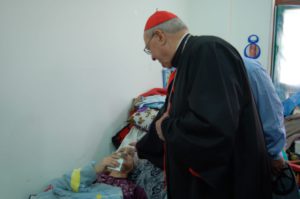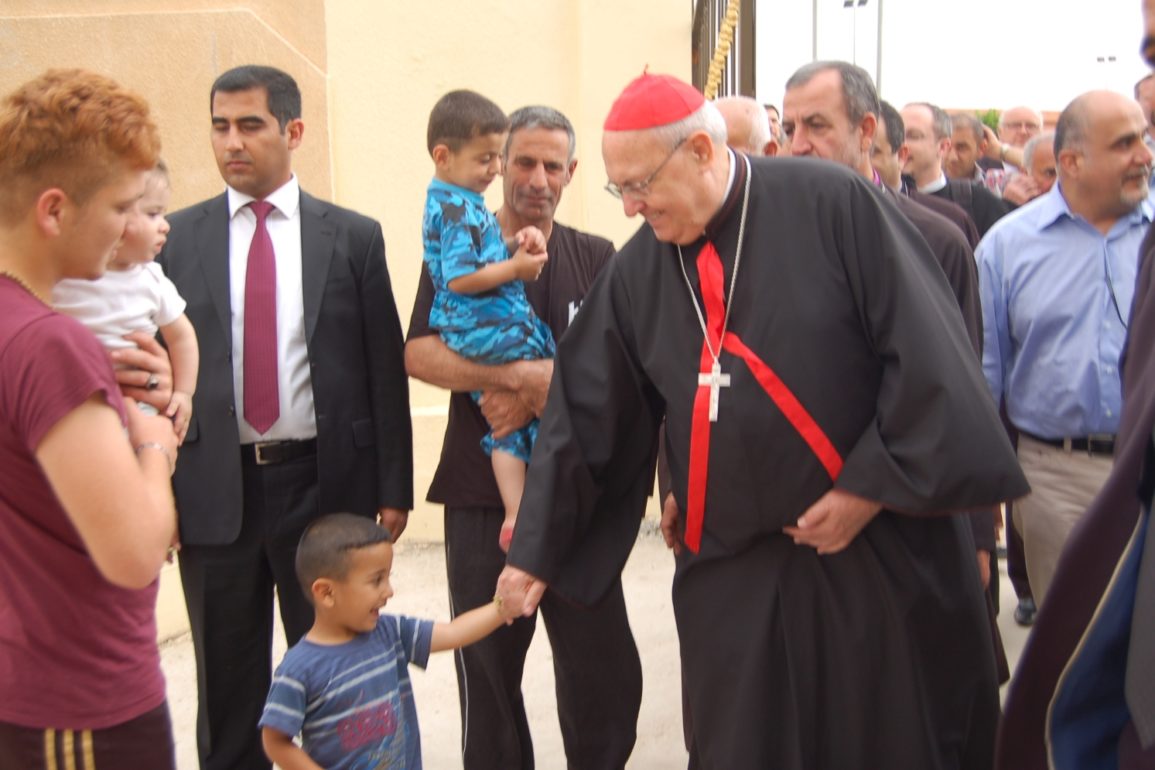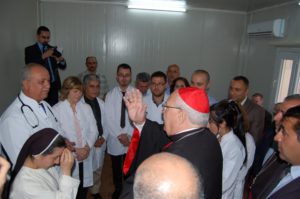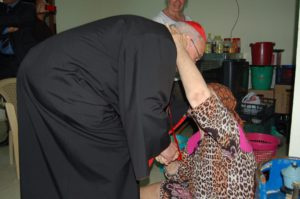“Pope Francis’ journey to Iraq,” Cardinal Leonardo Sandri says, “will certainly contribute to re-awaken the International Community’s awareness that Christians of the East, including the Iraqi, are not Christians that have arrived from outside: they are citizens of those lands since the origin; they love those lands, they preserve ancient traditions, languages and dialects and truly desire the good of those countries.”
In an exclusive interview with Exaudi originally published at the start of the Pontiff’s visit, the Prefect of the Congregation for the Oriental Churches and Sub-Dean of the College of Cardinals awaits with this certainty the Pope’s landing in Baghdad, for the first visit of a Pope to Iraq, from March 5-8. The first international papal journey, after the long months of the COVID pandemic, will be of interest not only to the country of destination: “this journey will question the whole of the International Community, on how it thinks of the Middle East today.”
In view of the Jubilee of 2000, Pope Saint John Paul II also wished to make a pilgrimage to Iraq. And his having to give it up “was something that caused him great suffering,” recalls Cardinal Sandri; however, he adds, “the Iraqis remember well that the only one who raised his voice loudly and clearly, condemning the invasion of Iraq in 2003 was, in fact, Saint John Paul II,” when Sandri was Substitute for General Affairs of the Vatican Secretariat of State. “The fact that the West did not listen to that prophetic voice is confirmed by the devastation that the Western military intervention caused in Iraq, with consequence still visible today.”
Here is Exaudi’s Deborah Castellano Lubov’s conversation with His Eminence:
***
EXAUDI: Eminence, Pope Francis is about to undertake the journey to Iraq that John Paul II so wished to do, for the Jubilee of 2000, but was then obliged to give it up. You were a very close collaborator of Pope John Paul II in the last phase of that pontificate. How much did he suffer that cancellation?
CARDINAL LEONARDO SANDRI: Yes, we all remember the journey towards the Great Jubilee of 2000, dedicated to the fundamental stages of the history of salvation and the Trinitarian mystery, with the Year of the Father, of the Son and of the Holy Spirit, and then that pilgrimage to Iraq in the footsteps of Abraham, which was the first of all those that would follow later. We recall that among the pilgrimages linked to the Jubilee event there were also those linked to the figure of the Apostle Paul, which took John Paul II to Syria and also to Greece and Malta. However, his having to give up the journey to Iraq was certainly something that caused him great suffering. However, deep down we can say that his acceptance of that cancellation was already an interior pilgrimage. At Ur, in Iraq, Abraham was called to leave his land and his certainties, and was even asked to be willing to sacrifice his son for the covenant with the Lord. Saint John Paul II, who so wanted to visit that land, lived deep down Abraham’s same feelings in giving up this pilgrimage and in the sacrifice of having to accept that situation.
EXAUDI: The papal trip to Iraq will put the spotlight on the Chaldean Church and on other Eastern Catholic Churches, scattered in Iraq and in the Middle East. In your opinion, what is the importance of this trip?
CARDINAL SANDRI: Iraq is certainly a place-symbol for the history of culture and also for Christian history. We all remember the so-called “Fertile Crescent” and Mesopotamia, between the Tigris and Euphrates rivers, where so many civilizations flourished. It is also interesting to note that, in fact, Abraham departed from those lands to go to the Promised Land, but the link with that country was never severed, first of all under the sign of pain, because with the Assyrians and Babylonians, it was a place of deportation for the Hebrews and then of liberation with the advent of Cyrus, when the people were able to return to the Promised Land and rebuild the Temple. Finally, Iraq was also a place of proclamation and evangelization when, through Antioch, the Gospel reached that land called Seleucia-Ctesiphon and the great Church of the East was developed. And this Church, which was almost unknown as it was outside the borders of the Roman Empire, spread even to China. Ancient dioceses in the steppes of Central Asia not only attest to it but also the Xi’an stele, written in Syriac characters.
EXAUDI: So there has been a Christian presence in Iraq that goes back to the origins of Christianity…
CARDINAL SANDRI: Yes, and, in fact, the Pope’s journey will be an occasion to rediscover the roots of an ancient, unknown Christianity, at times regarded as far from Rome, also from the theological point of view, even if later it recovered communion with Rome with the birth of the Chaldean Church. A Church that of itself remained an inspiring principle of the so-called Christians of Saint Thomas in India, because the Chaldean Patriarch ordained their Metropolitan. We are talking about ancient Churches, depositories of illustrious texts, for example, very ancient and very thought-provoking texts, such as the “Anaphora of Addai and Mari,” the Eucharistic Prayer, which belong to the Eastern Syriac Church and, therefore, to the present Chaldean Church. We are speaking of Churches of martyrs, not only of the past but also of the present. We recall the martyrs of the Syro-Catholic Cathedral of Baghdad (48 faithful killed by five terrorists on October 31, 2010, ndr) and also Chaldean Deacons and Priests killed a few years before. The Iraqi Church is a martyr Church, in the sense of “witness,” because it is called to live the Gospel in a context where, in any case, Christians are a small flock, made even smaller by the different wars of the so-called “Islamic State.” This is why Francis’ journey is a journey of hope.
EXAUDI: Why, Your Eminence?
CARDINAL SANDRI: Because it will be a way of saying “look, there are roots of civilization there, roots of cultures, roots of Christianity that go beyond the borders. And it will be a pilgrimage of hope for all those that in these decades have suffered because of their faith.
EXAUDI: If John Paul II had gone to Iraq in 2000, he would have found a much more numerous Catholic community than that of today. In fact, after the war of 2003 many Christians chose (or were often constrained) to emigrate. Could Francis’ journey by useful to stop this hemorrhage?
CARDINAL SANDRI: Pope Francis’ journey to Iraq will certainly contribute to reawaken the awareness of the International Community that Christians of the East, including the Iraqi, aren’t Christians that arrived from outside: they have been citizens of those lands since the origin, they love those lands, they preserve ancient traditions, languages and dialects and truly desire the good of those countries. If the external circumstances have constrained them progressively to leave, this doesn’t mean that this emptying must be total. In the most realistic of hypotheses, more than halting the exodus or allowing the return of those that left, the Pope’s journey must remind of the need to help those Churches, to make them rediscover their singular vocation of being Christians in those lands since the beginning, and to make those that left rediscover the force of evangelization. And here there come to mind two meetings that occurred during my trips.
EXAUDI: Which meetings?
CARDINAL SANDRI: One was a meeting with Iraqi refugees in Jordan after the conquest of the Nineveh Plains. There, taking up their confidences, I listened to their desire to be reunited with other relatives in Australia, the United States and Canada and their hope to get a visa to leave. They were clearly disappointed, in regard to the possibility of returning home, given that the Nineveh Plains were still occupied by Daesh.
EXAUDI: Could you share about the other meeting?
CARDINAL SANDRI: The second was a very moving meeting with two Chaldean communities at Essen, in Germany, and at Brussels, in Belgium. We are talking about very secularized countries, where often there is no one attending the liturgies and the churches are empty. And, instead, I have seen churches of those communities full of faithful, who were celebrating the Day of the Lord with prayer, catechesis, liturgy and also conviviality, sharing the joys and difficulties of living in new host countries. Therefore, there is certain hope that the hemorrhage of emigration will stop, but also the awareness of those that left of having to protect their vocation. Therefore, the protection that the West can guarantee to those communities is not simply that of wanting them to stay in their countries at all costs, but also of respecting them and of accepting their religious identity.
Cardinal’s Memories in Iraq
EXAUDI: There has been talk of this papal journey for years. In your trips to Iraq in past years, what sense of expectation did you perceive among Christians?
CARDINAL LEONARDO SANDRI: Iraq was certainly present in Francis’ dreams and desires, not only because it is one of the countries most talked about but, unfortunately, because of the sufferings of its people. And we know that the Pope has especially at heart the little ones and the poor. In fact, he has always chosen as the first objective of his journeys the countries suffering most; in Europe we think of his choice of Albania. In regard to Iraq, the Pope’s desire is old; he expressed it in June of 2019 when receiving members of ROACO’s Plenary, announcing to them, in fact, his desire to visit Iraq, an announcement that struck us and found us all somewhat unprepared because it wasn’t programmed.
EXAUDI: Really?
Yes, but those were words that came from his heart. Then, unfortunately, we learned about the impossibility to travel, given the pandemic and the sufferings of these months throughout the world. However, it’s significant that the Pope decided, among all the other possibilities of journeys, to confirm first of all his journey to Iraq, almost as if to say that it’s necessary to begin with that dimension of the exercise of the apostolic ministry, which is also through journeys abroad. And the first choice was, precisely, in Francis’ line: a country that has suffered and is still suffering.
EXAUDI: Could you elaborate personally about your visits to Iraq?
CARDINAL SANDRI: In my journey of December 2012 (when I attended the re-consecration of the Syro-Catholic Cathedral of Baghdad) the desire was not yet perceived of a visit of the Pope. In May of 2015, when I went again to Iraq, the country was still marked by the sufferings of the occupied Nineveh Plains by Daesh, so that it was unthinkable that the Pope could go there. However, I remember the warmth and affection that the people manifested to me on both occasions, because they knew that a close collaborator of the Pope was coming. And this gave them indescribable strength, as it did other Iraqi refugees that I visited in Jordan. All of them said to me: “take our greeting, our prayer to the Pope, tell him that we need him!” We must not forget that Iraqis remember well that the only one who in fact raised his voice loudly and clearly, condemning the invasion of Iraq in 2003, was Saint John Paul II. And the fact that the West didn’t listen to that prophetic voice is confirmed by the devastation that the Western military intervention caused in Iraq, with consequences still visible today.
EXAUDI: But what is the most vivid memory that you have there? And, in your opinion, what will strike Pope Francis most now?
CARDINAL SANDRI: The memories are many, I’ll mention a few. Francis’ first gesture on arrival will be his visit to the Syro-Catholic Cathedral of Baghdad. I, as I already said, went to that church in 2012, to re-consecrate it after the attack of which we spoke. I saw in a display case the bloodied garments of two priests who died in that attack and I visited also the so-called crypt, where the remains of those witnesses rest. I thought to myself also that if the liturgical rite foresaw the re-consecration of that church, after the profanation carried out by the terrorists, the blood of those martyrs already made the consecration, whose permeated garments were displayed in that case.
When we become cardinals, we are asked to make a promise of fidelity to the Pope usque ad effusionem sanguinis, to shedding our blood. Well, I found myself as a Cardinal in front of someone who, although not having made this promise, kept it to the end.
EXAUDI: Could you share another memory with us?
CARDINAL SANDRI: Then I visited a house, close to the Latin Cathedral of Baghdad, where Mother Teresa’s Sisters welcomed and received—now however together with the John XXIII Community founded by Don Benzi—young people with grave disabilities. Attention to the world of disability in the Middle East is still a delicate subject because often there is still shame; the disabled are kept hidden at home. Therefore, the love of Mother Teresa’s Sisters is truly a great witness and now the John XXIII Community also takes care of these young people, who must not be kept hidden. They must be loved and revered with care by the whole society, including the Iraqi. Then, in that context, I always remember the meeting with a boy who spoke about the difficulties of the absence of true religious liberty, referring to the registration on his identity document of his confessional membership. Finally, I remember a Mass in the open air with Patriarch Younan at Erbil in May of 2015, in the evening towards sundown, surrounded by a large crowd of displaced Christians of Mosul and Qaraqosh. Look, that Mass really brought to mind the scene of the multiplication of loaves and fishes. There was a great crowd tired from the journey, says the Gospel, and it seemed that there was nothing to eat; yet, in that celebration also, the bread of the Word and the bread of the Body and Blood of Jesus was nourishment that gave comfort.
Interreligious Dialogue at Forefront
EXAUDI: One of the intense topics of the papal journey to Iraq will be first of all the dialogue with the Islamic world, Shi’ite and Sunni, after the signing, two years ago, of the Document on Human Fraternity at Abu Dhabi, with the Grand Imam of Al Ahzar, Al Tayeb. In your opinion, what direction has that Document imprinted on the dialogue?
CARDINAL SANDRI: I remember that event well, having been present at Abu Dhabi. Given the Holy Father’s interest and as a Dicastery we collaborated so that in our Eastern Catholic Churches, especially those of the Middle East but also those of India, which live side by side with Hindus and Muslims, there should be knowledge and diffusion of this Document. Of course, we must be sincere: the Abu Dhabi Document isn’t a point of arrival but of departure.
EXAUDI: How so?
CARDINAL SANDRI: Documents are often the fruits of long labours, of long meetings and then one arrives at a draft. I am thinking, for example, of the Constitutional Charter of a country, as post-War Italy could be. The Document on Human Fraternity itself is a document that expresses a hope and indicates a commitment. It certainly moves one by the awareness that there was too much non-mutual knowledge, too much violence, and now, as after the World War, we say “never again, never again, never again!” In fact, we must look ahead and at many dimensions, as Pope Francis has indicated. It is a Document that must be made known, elaborated and diffused, to become the mirror, the litmus test with which to confront oneself. Then there is also Pope Francis’ Encyclical Fratelli Tutti, which is also an extension, in a more universal realm, of that subject. It is a challenge, especially if one keeps in mind that it would be erroneous to impose on the Islamic world, in itself more varied than we think, a unique feature of Al-Azhar’s University. It is an authoritative institution but it cannot be compared to a sort of Islamic Vatican. Al-Ahzar represents the Sunni world; however, as we know, the Shi’ite component also exists in Islam with tensions that reverberate at the political level in the Middle East. However, there is in fact a whole course of knowledge of ourselves and of mutual study that must be undertaken. The Document on Fraternity was an acceleration of the dialogue between Pope Francis and the Grand Imam of Al-Azhar, after years in which the confrontation had cooled down in some way. And although it did not produce documents of this importance, yet the dialogue also continued between the Pontifical Council for Inter-Religious Dialogue and the Islamic University of Qoms. It has to do with the holy Shi’ite city in Iran, whereas in Iraq, instead, the greater part of Shi’ite shrines exist of the great Twelve Imams. There is the possibility to open a new page, because Islam is not only the Sunni, but we want to build a universal fraternity with all, with the hope, therefore, that the internal divisions can be overcome in some way.
Situation of Middle East Christians, Beyond Iraq
EXAUDI: Catholics of other countries of the Middle East, close to Iraq, are also facing situations of grave suffering. I am thinking of the Pope’s address to the Ambassadors, in which he mentioned Syria, which has reached the tenth year of war; of Lebanon, which risks losing its identity as a diversified and tolerant country, of the Holy Land, where Christians are also suffering the absence of pilgrims because of COVID . . . What hope can the Pope in Iraq give all of them?
CARDINAL SANDRI: It’s true that to go to Iraq Francis will skirt Syria with the plane, and perhaps in the interview or in the telegrams to Heads of State he will not fail to address a thought to a country whose situation cries out its scandal to the whole world: 10 years of conflict, so many dead, millions of internally and externally displaced, people famished in the extreme and without anything, without schooling, with the risk, then, that this situation will reverberate if not as a war as a social drama, also in neighboring Lebanon. It’s clear that the Pope’s journey to Iraq cannot but be a sign pointing to the Middle East, which cannot be thought simply as a place of eternal conflict, but that it’s hope will return to be witness of its past as the cradle of civilization and place of encounter among different peoples. Let us not forget the lessons of Saint John Paul II, who spoke of Lebanon as a “Country-Message,” and that of Benedict XVI who described it as a “laboratory.” Lebanon, in fact, is truly a laboratory because it lives of a coexistence recognized mutually — although with delicate balances but which endure — between Christians and Muslims of different Confessions, in addition to the Druze. To summarize, the Pope’s journey to Iraq cannot but pose a question to the International Community on what it wants to think of this Middle East. We know how the Pope, for example, has at heart the subject of justice in the light of the Social Doctrine of the Church. We recall his words at Bari, on July 7, 2018, lamenting the arms trafficking. Now we do not want some international actors to pass from profiting on the sale of arms to profiting from the reconstruction, for example of Syria, which is urgent in the extreme for the people. Help the poor people exhausted by conflicts, who depend on control rooms that are elsewhere.
EXAUDI: And the Holy Land?
CARDINAL SANDRI: The papal journey to Iraq makes us hope that pilgrims will soon be able to return I don’t say to Iraq or Syria, but at least to the Holy Land. Because, as I’ve already said on other occasions, the Urbi et Orbi of March 27 in Saint Peter’s Square, with the Pope who walked alone, under the rain, to the Crucifix, in those days close to Easter, recalled those places of the Old City of Jerusalem completely deserted, where no one except for the friars who were already inside the Holy Sepulcher, could go to celebrate the mysteries of our salvation.
EXAUDI: Lebanon was also among the papal journeys foreseen. In your opinion, could it be undertaken soon?
CARDINAL SANDRI: Lebanon was the last country visited by Pope Benedict XVI and Pope Francis has many times mentioned Lebanon, calling the Lebanese ecclesial, civil and political world to its responsibilities. Lebanon is certainly a country that it is hoped the Pope might visit soon, precisely because what the Document on Human Fraternity affirms is at the base of Lebanon’s identity. However, we remember that after the explosion in Beirut’s port on August 4, 2020, the Pontiff sent personally, as his particular delegate and representative, the Cardinal Secretary of State — sign of how the Pope has Lebanon at heart, even if at the moment he cannot go there physically. We hope he will in the future! Moreover, the Holy Father himself stated it in a letter of December 24 to the Lebanese: “my affection for the beloved people of Lebanon, whom I hope to visit as soon as possible.”
EXAUDI: Eminence, is there something else you would like to add?
CARDINAL SANDRI: Thank you for listening! And I make an appeal through the readers of Exaudi, which thus opens its editorial production, to remember the Holy Land, in keeping with Pontiffs’ desire, also confirmed by Pope Francis, through the annual Pro Terra Sancta Collection, traditionally held on Good Friday before the Mystery of Christ who dies on the Cross, but that every Episcopal Conference can coordinate to hold on another day of the year, communicating it in time to the faithful of their dioceses.
EXAUDI: Thank you for your time, Cardinal Sandri…












